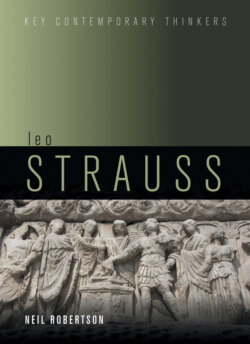Читать книгу Leo Strauss - Neil G. Robertson - Страница 12
The Exoteric/Esoteric Distinction
ОглавлениеOne of Strauss’s fundamental and recurring arguments is that philosophy, as the life given to questioning in the pursuit of wisdom, is inherently opposed to the nature of the “city” (or, more generally, of society) as a way of life founded upon opinion and above all upon belief in the justice of the laws of the city. In order that philosophers would not be persecuted nor the city be harmed, according to Strauss, philosophers began to conceal their true teaching behind an outer or “exoteric” teaching that would, at least on the surface, suggest that philosophy supported the ways of the city. In other words, the tension between philosophy and the city gave birth to an art of writing for philosophy: the art of esoteric writing.
The exoteric/esoteric distinction can appear to be a plausible claim that philosophers, facing potential persecution, have not always been open about their thoughts, and so interpreters must “read between the lines.” At one level, Strauss is certainly saying this. Importantly, however, he connects this historical point to the deeper claim that underlying what appears to be an occasional strategy is a fundamental opposition between philosophy and the city.
Here we can see that the exoteric/esoteric distinction is also a manifestation of another crucial aspect of Strauss’s thought: “political philosophy.” For Strauss, political philosophy is not primarily a branch or field of philosophy; rather, it is a way in which, or an awareness with which, philosophy is practiced. Political philosophy is philosophy aware of its political context and beginning point. Strauss argues that classical political philosophy is especially self-aware in this regard. It is characteristic of modern political philosophy to practice esoteric writing in the service of seeking to change the world and so eventually to bring about a modern world in which a free, enlightened people can live without the need for such devices. Strauss’s judgment, arising from his sense of nihilism, is that this modern project has failed. It is only in classical political philosophy, which is aware of the irreducible difference between philosophy and the city, and which practices esoteric writing in the service of that difference, that we can find a stable standpoint and so escape a nihilistic result.
